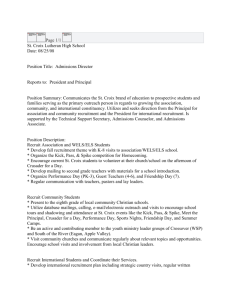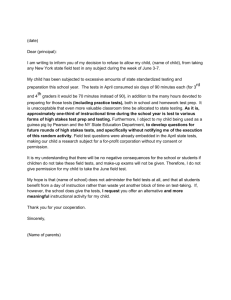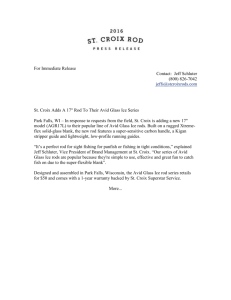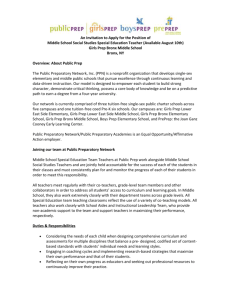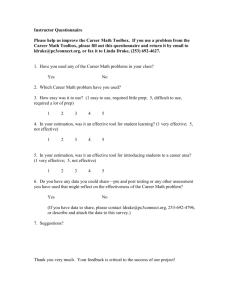SCPA Homework Philosophy October 2015
advertisement
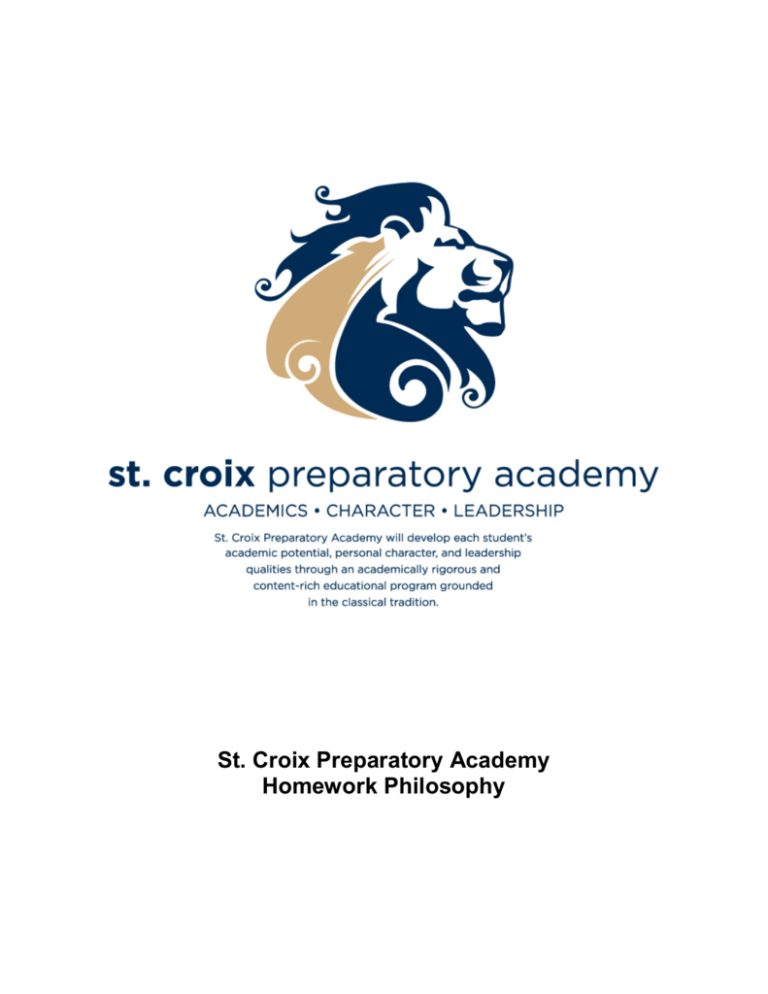
St. Croix Preparatory Academy Homework Philosophy St. Croix Preparatory Academy Homework Philosophy GENERAL INFORMATION Students at St. Croix Preparatory Academy receive homework regularly. Homework is integral to a student in a rigorous college prep school. Homework is an invaluable tool to the learning process and an integral part of a student’s educational and emotional growth. It fulfills both academic and character education objectives. When we design and assign homework at St. Croix Prep, we understand its three primary academic purposes to be: • Preparation. Homework allows the student to prepare for a challenging lesson by grounding him/herself in introductory materials. In turn, this allows for class presentations and discussions to be more engaging. • Reinforcement. Homework allows the student to practice concepts introduced in class to attain familiarity. • Mastery. Homework allows the student to practice concepts to the point of personal proficiency, which is necessary to move forward in a content-based curriculum. In addition to the academic goals of homework, homework serves aspects of character education; it builds up the qualities in a child necessary to succeed throughout life, like discipline, planning, time management, decision-making, and accepting responsibility for one’s actions. St. Croix Prep attempts to design homework assignments to meet these academic and character learning goals. MISSION OF ST. CROIX PREPARATORY ACADEMY St. Croix Preparatory Academy will develop each student’s academic potential, personal character, and leadership qualities through an academically rigorous and content rich educational program grounded in a classical tradition. ACADEMIC OBJECTIVES St. Croix Prep is a college prep K-12 school. By design and intention it is meant to be a more academically rigorous educational choice available to parents. This is reflected in the School’s mission, expectations, curriculum, and homework. We believe this college preparatory work begins in Lower School where it is essential that students begin to exhibit reading and math proficiency. In Middle School, the efforts continue through students’ further mastery of reading and math content, as well as their transition to become a responsible student, independent of their parents’ assistance. In Upper School, we offer curriculum and extracurricular activities which allow students to pursue admission to traditional, selective, and highly selective colleges and universities. Prior to discussing the details of homework expectations, it is important to highlight the following information. Depending on the research you read, this information may vary, but it only varies slightly. • In 2009, the Program for International Students Assessment ranked the United States 14th in reading, 17th in science, and 25th in math. The ranking was based on the testing done in 34 countries. • According to the Kaiser Family Foundation, children between the ages of 8-18 spend, on average, 45 hours of screen time per week (e.g. watching TV, texting, playing video games, social media, etc.). This is more time than children spend in the classroom. • According to the U.S. Department of Education, as published in The Condition of Education 2011, approximately 36% of undergraduate students considered to be in their first year of study during 2007-2008 reported taking a remedial class. These remedial classes, usually in mathematics, writing, or English, provide basic knowledge and skills within a subject and develop studying and social habits related to academic success at the college level. St. Croix Prep intends to offer an educational program that does not contribute to these statistics, which appear to indicate a decline in our country’s educational standards. SCPA offers curriculum and extracurricular activities which allow students to pursue admission to traditional, selective, and highly selective colleges and universities. Our goal is that our graduates are not a part of the pool of students who require remedial classes upon entering their postsecondary institution. The foundational skills and habits required to achieve this goal begin developing in Kindergarten. HOMEWORK GUIDELINES All St. Croix Prep students, with the exception of Kindergarten students, should expect daily homework. St. Croix Prep intends to make homework purposeful and aligned with the goals of a delivering a college preparatory education. General homework guidelines are: • Lower School (K-4) – from 20 minutes to 1 hour per night • Middle School (5-8) – from 1.5 hours to 2.0 hours per night • Upper School (9-12) – from 2 to 3 hours per night These are only guidelines. Homework should be completed in a quiet environment, free from technology distractions. In addition, these estimates do not take into consideration critical times of the year (e.g. mid or end of quarter) when additional time may be needed for project completion or test preparation. These average estimates do not consider individual student learning styles, needs, efficiencies, or family educational goals (e.g. grades, college/university aspirations, etc.). In the event a student is experiencing more homework than these guidelines, please schedule a meeting with the appropriate teacher and/or contact the School Principal for a homework log. These guidelines, especially as they relate to Upper School, are for those students hoping to receive B’s and seeking admission to a traditional or selective college/university. Those students enrolled in Advanced Placement classes, seeking A’s and admission to a highly selective college/university may experience higher workloads. Aside from the intellectual benefits gained through homework, students learn the benefits of hard work, discipline, failure, success, time management, organizational skills, confidence, and perseverance. These skills have lifelong benefits. For these reasons, and for the items previously noted, we respectfully disagree with literature and national campaigns that endorse a homework philosophy that differs from our mission. FREQUENTLY ASKED QUESTIONS/COMMENTS Q: St. Croix Prep’s school day ends at 4:00 pm and after the students arrive home after the bus or their ride home, there is less time to complete the homework. A: The bus transportation is provided by Stillwater Area Public Schools, and therefore the start/end times of our school day is determined by them. We recognize the challenges posed by a later release time. However, many families have found that this later start (9:30 am) time allows for an additional hour of time in the morning that may be utilized for study and homework. Q: How do you respond to research, literature, and proponents of less homework (e.g. Race to No Where, author Alfie Kohn – The Homework Myth, Etta Kralovec and John Buell – How Homework Disrupts Families, Overburdens Children, and Limits Learning, etc.). A: We respectfully and briefly note the following: • The current educational environment, and associated homework emphasis, is one of the reasons for the poor international performance (in reading, math, and science) by American students. • Some authors (e.g. Kohn) and proponents of no/less homework hold educational philosophies which are diametrically opposed to a classical model of education. • There is little to no research on homework in college preparatory schools. Most of the research and literature relates to differing demographic environments than St. Croix Prep. • The amount of time a teenager spends on technology is often ignored in this conversation (e.g. research by the Kaiser Family Foundation, Pew Research Center, etc.). In addition, the additional time requests from other organizations (e.g. musical, religious, and athletic) are not considered in this discussion. Q: What resources did St. Croix Prep use in originally determining its homework philosophy? A: Prior to the opening of St. Croix Prep in 2004, our educational and homework philosophy was influenced by conversations and visits with some of the highest performing schools in the country, including Ridgeview Classical Schools (Colorado), Tempe Prep (Arizona), New Trier High School (Illinois), and Boston Prep (Massachusetts). Q: How do you respond to the concern that the amount of homework at St. Croix Prep prevents students and families from maintaining a balanced life? A: The time and lives of our students and families are receiving an enormous amount of pressure from many places. These include technology (e.g. Netflix, TV, video games, texting, twitter, Instagram, snapchat, etc.), music (e.g. private music lessons, outside performing groups, etc.), athletics (e.g. AAU athletics, club sports, training camps, etc.), and religious organizations (e.g. Wednesday evenings, weekend activities, etc.). Each family must determine the appropriate balance. Finally, homework completion and grade expectations must be aligned with each family’s post-secondary educational goals (e.g. AP classes, ACT scores, grades, and extracurricular activities reflect admission requirements of colleges/universities to which they are seeking entrance.) Q: How does grading integrity of St. Croix Prep impact this homework discussion? A: Regarding college admissions, “A’s” are generally required (or highly recommended) for consideration into highly selective colleges and universities. If post educational pursuits do not include these types of institutions, earning all “A’s” is not necessary. St. Croix Prep’s grading system and corresponding expectations are aligned with approximate minimum admissions requirements for highly selective (generally A’s), selective (generally A’s, B’s), traditional (generally B’s and C’s), community (generally C’s and D’s) and open (generally D’s) schools. While the preceding statement is a generalization, this grading integrity allows each student/family to pursue the opportunity that appeals to their family. Q: What if I do have concerns with the amount of homework, a particular class, or assignment. A: The communication protocol, which has been established since 2004 allows for discussion and resolution of homework situations. It is important to initially contact the teacher; if the situation remains unresolved, then contacting the principal is appropriate; if the situation still remains open, contacting the executive director is appropriate. NOTE: This process is particularly important to follow since each student is unique in their skills, aptitude, organization, study environment, and study habits; and each teacher has a unique perspective on the work habits and performance of the student so visiting with them first is essential. Q: What homework tips can you offer a student? A: Developing good organizational skills is a key ingredient for success in school and in life. Although some people by nature are more organized than others, anyone can put routines and systems in place to assist in accomplishing tasks and goals, including homework. • Use the School Planner. Help your child get into the habit of keeping a “to-do” list within the planner. Use the planner checklists to record assignments and have your child review the planner with you every day. Crossing completed items off the list will give him/her a sense of accomplishment. • Organize homework assignments. Before beginning a homework session, encourage your child to number assignments in the order in which they should be done – start with one that’s not too long or difficult but avoid saving the longest or hardest assignments for last. • Designate a study space. Your child should study in the same place every night. This doesn’t have to be a bedroom, but it should be a quiet place with few distractions, free from technology. • • • • Set a designated study time. Your child should know that a certain time every day is reserved for studying and doing homework. The best time will depend on other activities and family commitments. Include your child in making this decision. Keep organized notebooks. Help your child keep track of papers by organizing them in a binder or notebook. This will help him review the material for each day’s classes and to organize the material later to prepare for tests and quizzes. Use dividers to separate class notes, or color-code notebooks. Separate “to do” and “done” folders help organize worksheets, notices, and items to be signed by parents, as well as provide a central place to store completed assignments. Conduct a weekly clean-up. Encourage your child to sort through book bags and notebooks on a weekly basis. Old tests and papers should be organized and kept in a separate file at home. Keep a master calendar. Keep a large, wall-sized calendar for the household that lists the family’s commitments, schedules for extracurricular activities, days off from school, and major events at home and at school. Note dates when your scholar has big exams or due dates for projects. This will help family members keep track of each other’s activities and avoid scheduling conflicts. Q: What additional resources has St. Croix Prep analyzed in determining its homework philosophy? A: The following materials have been reviewed: General Education Information • Program for International Students Assessment, 2009; • US Department of Education in “The Condition of Education 2011”; • Inside American Education by Thomas Sewell; • The Schools We Need and Why We Don’t Have Them, by E. D. Hirsch, Jr.; • Class Warfare: Besieged Schools, Bewildered Parents, Betrayed Kids and the Attack on Excellence by J. Martin Rochester; • Cultural Literacy, by E. D. Hirsch, Jr.; • “Does Homework Improve Academic Achievement? A Synthesis of Research 1987-2003 (Cooper); Stanford Report 2014 Technology Usage by Teenagers Today • Kaiser Family Foundation, “Generation M2: Media in the Lives of 8-18 Year Olds”; • Pew Research Center, “Teens, Social Media and Technology Overview 2015”. Miscellaneous and Related Information • Film Documentary: Race to Nowhere (focusing on the pitfalls of homework); • Film Documentary: Two Million Minutes; • • • • • • • • • • • • • • Mindset, by Carol Dweck; Talent is Overrated, by Geoff Colvin; The Talent Code by Daniel Coyle; The End of Homework: How Homework Disrupts Families, Overburdens Children, and Limits Learning by Etta Kralovec and John Buell; The Homework Myth: Why Our Kids Get Too Much of a Bad Thing, by Alfie Kohn; Counterfeit Kids: Why They Can’t Think and How to Save Them, by Rod Baird; The Power of Habit: Why We Do What We Do in Life and Business, by Charles Duhigg; The Gift of Failure: How the Best Parents Learn to Let Go So Their Children Can Succeed, by Jessica Lahey; When Can You Trust the Experts: How to Tell Good Science From Bad in Education, by Daniel Willingham; Outliers: The Story of Success, by Malcolm Gladwell; Our Kids: The American Dream in Crisis, by Robert Putnam David and Goliath: Underdogs, Misfits, and the Art of Battling Giants, by Malcolm Gladwell; Practice Perfect: 42 Rules for Getting Better at Getting Better, by Doug Lemov; Hundreds of conversations with college recruiters throughout the history of St. Croix Prep

